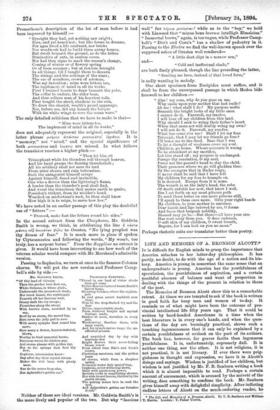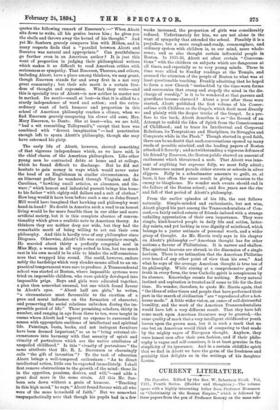LIFE AND MEMOIRS OF A. BRONSON ALCOTT.* IT is difficult
for English minds to grasp the importance that America attaches to her latter-day philosophies. It has partly, no doubt, to do with the age of a nation and its his- tory. America is young in somewhat the same sense that an undergraduate is young. America has the youthfulness of speculation, the youthfulness of aspiration, and a certain youthful absence of balance and want of proportion in dealing with the things of the present in relation to those of the past.
The Memoirs of Bronson Alcott show this to a remarkable extent. At times we are tempted to ask if the book is written in good faith for busy men and women of to-day. It reminds us of what might have been the outcome of pro- vincial intellectual life fifty years ago. That it could be written by hard-headed Americans in a time when the best literature is in every one's hands, and when the ques- tions of the day are burningly practical, shows such a touching ingenuousness that it can only be explained by a certain youthfulness of outlook on the part of its authors. The book has, however, far graver faults than ingenuous youthfulness. It is, unfortunately, supremely dull. It is neither one thing, nor the other. It is not religious, it is not practical, it is not literary. If ever there were prig- gishness in thought and expression, we have it in Alcott's doings and sayings. Wisdom is justified of her children, but wisdom is not justified by Mr. F. B. Sanborn writing a book which it is almost impossible to read. Perhaps a certain amount of amusement, which is aroused by the naivete of the writing, does something to condone the book. Mr. Sanborn gives himself away with delightful simplicity. After inflicting endless letters of Alcott on the much-enduring reader, he • The Life and Memoirs of A. Bronson AWL By F. B. Sanborn and William T. Harris. London : T. Fisher II:min.
quotes the following remark of Emerson's :—" When Alcott sits down to write, all his genius leaves him ; he gives you the shells and throws away the kernel of his thought." And yet Mr. Sanborn gravely compares him with Milton, and in many respects finds that a "parallel between Alcott and Socrates was natural and appropriate." Can youthfulness go further even in an American author P It is just this want of proportion in judging their philosophical writers which makes it so difficult to read American critics with seriousness or sympathy. That Emerson, Thoreau, and others, including Alcott, have a place among thinkers, we may grant, though Emerson stands far and away first in a not very great community; but their sole merit is a certain free-
dom of thought and expression. What they write and this is specially true of Alcott—is new neither in matter nor in method. Its merit—small at best—is that it is allied to a sturdy independence of word and action ; and the extra- ordinary want of both humour and proportion in this school of American philosophy reaches a climax, when we find Emerson gravely comparing his clever old aunt, Mrs. Mary Emerson, to Dante. She at least—who, we are told, " had a wit resembling Talleyrand's," except that hers was combined with " devout imagination " — had penetration enough left to spurn Alcott's philosophy, though she may have esteemed his piety.
The early life of Alcott, however, showed something of that vigorous independence which, as we have said, is the chief charm of the American philosophers. Like other young men he contracted debts at home and at college, which he found difficult to discharge. But he did not hesitate to gain money in ways which would never enter the head of an Englishman in similar circumstances. As an itinerant pedlar he wandered through Virginia and the Carolinas, " hawking small articles, as almanacs, and tin- ware ;" which honest and industrial pursuit brings him home to his father " with eighty-odd dollars and a suit of clothes." How long would it have been before such a one as John Stuart Mill would have imagined that hawking and philosophy went hand-in-hand P No doubt in America such a road to an honest living would be far more feasible than in our older and more artificial society, but it is this complete absence of conven- tionality which gives a realistic note to American theory. As thinkers they are neither deep nor wide, but they had the remarkable merit of being willing to act out their own philosophy. And this is hardly true of any philosopher since Diogenes. Otherwise, Alcott's life was commonplace enough. He married about thirty a perfectly congenial soul in Miss May, a woman in all ways suited to him, but too much cast in his own mould to be able to hinder the self-conscious- ness that wrapped him round. She could, however, endure nobly the hardships which very slender means allied to an un- practical temperament were sure to produce. A Transcendental school was started at Boston, where impossible systems were tried on impossible children, who were quickly developed into impossible prigs. Boys and girls were educated together, a plan then somewhat unusual, but one which found favour in Alcott's eyes. " About half are girls," he writes, "a circumstance most favourable to the exertion of a pure and moral influence on the formation of character, and preserving the social relations unbroken during the im- pressible period of life." These promising scholars, thirty in number, and ranging in age from three to ten, were taught in rooms where Alcott had " spared no expense to surround the senses with appropriate emblems of intellectual and spiritual life. Paintings, busts, books, and not inelegant furniture have been deemed important," so as to " bring external cir- cumstances into harmony with that serenity of spirit and vivacity of portraiture which are the native attributes of unspoiled childhood." Is this " vivacity of portraiture " the same attribute that Mr. R. L. Stevenson so charmingly calls " the gift of invention " ? To the task of education Alcott brings a well-tempered enthusiasm : "As to direct intellectual action, little can be expected immediately. I shall first remove obstructions to the growth of the mind : these lie in the appetites, passions, desires, and will,"—and adds a great deal more in the same strain. All this Mr. San- born sets down without a grain of humour. "Teaching in this high mood," he says, " Alcott found favour with all who were of the same household of faith." But we somewhat unsympathetically note that though his pupils had in a few weeks increased, the proportion of girls was considerably reduced. Unfortunately for him, we are not alone in the want of sympathy that attended the school. Possibly it is a prejudice; but a more rough-and-ready, commonplace, and ordinary system with children is, to our mind, more whole- some ; and so also thought certain influential people in Boston. In 1835-36, Alcott set afoot certain " Conversa- tions " with the children on subjects which are dangerous at all times, and especially so to very young minds. These in time were allied to Sunday readings at the Temple, and aroused the attention of the people of Boston to what was at least questionable teaching. Frankly admitting that he hoped to form a new Church " unshackled by the time-worn forms and ceremonies that cramp and stupefy the mind in the dis- charge of worship," is it to be wondered at that parents and guardians became alarmed P About a year after these were started, Alcott published the first volume of his Conver- sations with Children on the Gospels, which dealt most directly and plainly with the deeper truths of the Gospel. In a pre- face to the book, Alcott describes it as " the Record of an Attempt to unfold the Idea of Spirit from the Consciousness of Childhood ; and to trace its Intellectual and Corporeal Relations, its Temptations and Disciplines, its Struggles and Conquests while in the Flesh." Though started in good faith, there can be no doubt that such conversations opened up many roads of possible mischief, and the leading papers of Boston attacked it fiercely ; and notwithstanding a vigorous defence of his friend by Emerson, the Boston public showed an amount of excitement which threatened a mob. That Alcott was inno- cent of anything but supreme folly, we most fully admit ; but innocence cannot parade either streets or schools in silver slippers. Folly in a schoolmaster amounts to guilt, or, at least, it has often the same result in giving occasion to the enemy to blaspheme. No wonder such events should end in the failure of the Boston school ; and five years saw the rise and fall of that period of Alcott's philosophy.
From the earlier episodes of his life, the rest follows naturally. Simple-minded and enthusiastic, but not wise, Alcott played his part among the Transcendentalists of Con- cord, —a fairly united coterie of friends imbued with a. strange unfailing appreciation of their own importance. They were simple, kind-hearted people in daily life and action, latter- day saints, and yet lacking in true dignity of sainthood, which belongs to a juster estimate of personal worth, and a wider grasp of thought. As Mr. Harris truly says in his chapter on Alcott's philosophy :—" American thought has for other nations a flavour of Philistinism. It is narrow and shallow. The spiritual heavens are shrank to the dimension of a single horizon. There is no intimation that the American Philistine ever heard of any other point of view than his own." And what he says of the average American thought is true too of its philosophy. While aiming at a comprehensive grasp of truth in every form, the true Catholicmirit is conspicuous by its absence. Knowledge counts for nothing. Every natural instinct and aspiration is treated as if come to life for the first time. No wonder, therefore, to quote Mr. Harris again, that " the ideas of other times and people that have performed their part in the march of civilisation " are " reproduced after a hot- house mode." A little wider vision, an ounce of self-distrustful humility, and the work of the American Transcendentalists would have left a very different result. That they have left some mark upon American literature may be granted,—the same quality of mark that a very intelligent childhood or youth leaves upon the grown man, but it is such a mark that no one but an American would think of comparing to that made by the mighty sages of European thought. Anyhow, they were honest men after their own fashion, and if their philo- sophy is vague and self-conscious, it is at least genuine in the simplicity of its ignorance. And in a certain childlike spirit that we find in Alcott we have the germ of the freshness and geniality that delights us in the writings of his daughter Louisa.



































 Previous page
Previous page